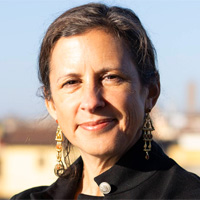Bio
Jessica Fanzo is James Anderson Professor of Food Policy & Climate
at SAIS Europe
Before coming to SAIS Bologna in 2023, Professor Fanzo was a Professor of Climate and Food and the Director of the Food for Humanity Initiative at Columbia University’s Climate School. Prior to that, she served as the Bloomberg Distinguished Professor of Global Food Policy and Ethics at Johns Hopkins University. She has also held positions at the Food and Agriculture Organization of the United Nations (UN), the UN World Food Programme, Bioversity International, the Earth Institute, the Millennium Development Goal Centre at the World Agroforestry Center in Kenya, and the Doris Duke Charitable Foundation.
She has participated in various collective endeavors, including the Food Systems Economic Commission, the Global Panel of Agriculture and Food Systems for Nutrition Foresight 2.0 report, the Lancet Commission on Anaemia, and the EAT-Lancet Commissions 1 and 2. She was also the Co-Chair of the Global Nutrition Report and Team Leader for the UN High-Level Panel of Experts on Food Systems and Nutrition. Fanzo was a board member of the Integrated Partnership Board of the CGIAR, the International Livestock Research Institute, and the Alliance for Bioversity and CIAT until the end of 2025 and continues to serve as the co-Chair of the Executive Committee for the Scaling Up Nutrition Movement. She currently leads the development of the Food Systems Dashboard and the Food Systems Countdown to 2030 Initiative.
With more than twenty years of research and program experience working in the field in sub–Saharan Africa, South and East Asia, and the United States, her area of expertise focuses on the impact of transitioning food systems on healthy, environmentally sustainable and equitable diets, and more broadly on the livelihoods of people living in resource-constrained places. In 2021, she published her first book,
Can Fixing Dinner Fix the Planet?, and co-wrote
Global Food Systems, Diets, and Nutrition: Linking Science, Economics, and Policy.
Fanzo holds a PhD in nutrition from the University of Arizona and completed a Stephen I. Morse postdoctoral fellowship in immunology in the Department of Molecular Medicine at Columbia University's College of Physicians and Surgeons. She became an elected member of the U.S. National Academy of Sciences in 2024.
Courses
- Food Systems & Climate Futures
Food systems are a complex web of activities and actors engaged in the production, processing, transport, retail, trade, consumption, and waste of food. Food systems are deeply entangled with the climate crisis. They are both victims and drivers of climate change, shaped by and shaping a world of increasing volatility—through extreme weather, supply shocks, geopolitical instability, and ecological decline. This course critically examines these feedback loops across the global food system—from production and trade to consumption and waste—while interrogating potential solutions for transformation.
The course introduces systems thinking and explores how climate change affects each node of the food system—and how food systems in turn impact climate and planetary health. Through deep-dive case studies, applied debates, and field engagement, students will develop the tools to assess trade-offs, envision futures, and grapple with the ethical and practical challenges of creating food systems that are just, sustainable, and resilient.
- Global Food Systems and Security: Policy, Politics and Power
Food systems are more than supply chains—they are political battlegrounds. In an era marked by global instability, food has become both a driver and a casualty of conflict, climate change, inequality, and authoritarian resurgence. This course investigates how the governance of food systems intersects with national security, geopolitical tensions, and global development agendas.
Drawing on frameworks from political economy, ethics, and food systems science, students will explore the actors and interests that shape food policy—from national governments and multinational corporations to social movements and humanitarian agencies. Through case studies and policy simulations, we will examine how issues such as food trade, land control, migration, subsidies, and dietary transitions shape not only food and nutrition outcomes but also international relations, peace, and stability. Special attention is paid to how power is wielded—and contested—across and within borders in pursuit of food security, justice, and influence.
